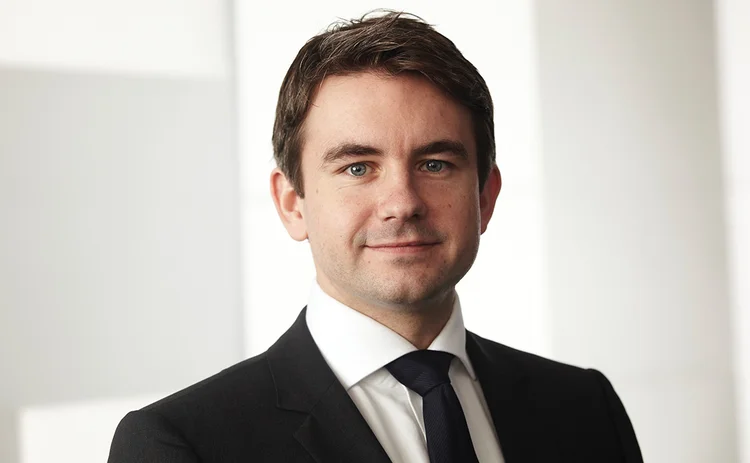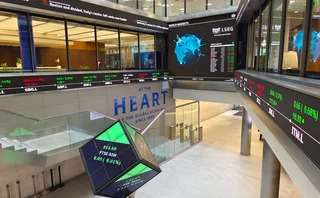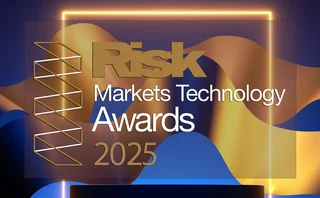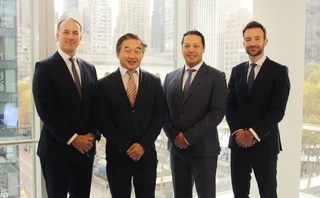
Germany house of the year: Commerzbank
Structured Products Europe Awards 2017: Commerzbank takes the award through breadth of its offering and its ability to keep pace with client demand

As one of the pioneers of German’s structured products market, Commerzbank brings a long pedigree and a reputation for customer service.
“We have a good name in Germany as we’ve been active in the market for more than 25 years,” says Anouch Wilhelms, the bank’s Frankfurt-based director for equity markets and commodities, public distribution.
The company also offers a product range that is hard to beat, with no fewer than 150,000 structured products on offer to German clients.
“Commerzbank has definitely got the broadest offering in terms of underlyings and structures,” says Matthias Hach, head of brokerage at comdirect, a bank and securities broker. “Even more importantly, Commerzbank is able to hold its prices and make a market even when the market is moving very fast.”
Indeed, the bank was judged to offer the best pricing for structured products in an annual survey of the market carried out by specialist publication Der Zertifikateberater/Finanztreff.de – for seven years in a row.
“Commerzbank is one of the top performers,” agrees Bjoern Andersen, head of division, product management at BNP Paribas Personal Investors in Munich. “With services such as intraday issuing and a huge range of factor certificates, Commerzbank meets the needs of our customers.”
The bank has had a particularly strong year in leveraged structured products – a sub-sector of the market that it pioneered with the launch of the first Factor-Certificate in Germany in 2009. It was the leading issuer of such products over the first seven months of 2017, accounting for some 20% of leveraged products traded on Boerse Stuttgart and Boerse Frankfurt, edging Deutsche Bank into second place.
Excluding leveraged products, Commerzbank had almost €4 billion ($4.7 billion) of structured products outstanding as of June, including almost €1 billion of participation certificates and €879 million autocalls.
German structured product investors currently favour structures with plain vanilla payouts such as discount certificates, bonus certificates, reverse convertibles or express certificates, says Wilhelms, “Clients are asking for products that are easy to understand,” he adds.
The market in Germany is characterised by demand for autocallable structures and reverse convertibles
Anouch Wilhelms, Commerzbank
The bank cites as an example its Axa Airbag structure, a five-year memory express certificate that allows the buyer to take some equity risk, but with reduced volatility. If the share price of Axa is below its initial spot price of €25.12 but greater than the barrier strike price of €12.56 on each annual observation date of August 1, the buyer receives a 4% coupon each year.
With the memory feature, if it has climbed back above the barrier on the second or subsequent observation date, the holder would receive those unpaid coupons from prior years.
At maturity, the holders will receive their principal unless the stock has declined below the barrier strike. Conversely, if the Axa share price on any of the annual observation dates is above the initial stock price, the structure will be redeemed and the holders will receive 100% of their principal.
“The problem right now for clients is to generate yield. The major selling point is the probability of getting 4% yield for the structure, if you think that the level of €12.56 will not be reached,” says Wilhelms. To evaluate the fair price of these types of autocallable structure, Commerzbank uses Monte Carlo simulation rather than replicating the payout with a combination of plain vanilla and barrier options.
Similarly, the bank saw success with a five-year step-down autocallable certificate that referenced Allianz as the underlying. The product pays a coupon of 7.05% if the spot price is above the initial level after a year, at least 90% of the initial level after two years, 80% in year three, and at least 65% in 2021 and 2022.
Wilhelms also reports strong demand for the BMW Reverse Convertible Bond Protect, a one-year note issued in January that offers a 6% coupon plus the full notional, assuming the underlying share price at maturity does not fall more than 20% below the initial spot price. If it does, the holder receives BMW stock. The product – of which €10 million-worth were sold through Comdirect – was structured so that the investor buys a coupon bond and sells a European-style knock-in put option with a barrier of 80% and a strike of 100% of the initial spot price.
“The market in Germany is characterized by demand for these types of autocallable structures and reverse convertibles at the moment,” Wilhelms adds.
With low interest rates and dampened volatility, structurers have had to rely on dividends to structure products. “A bit more volatility, and interest rates a bit higher, could provide the market with a big boost,” he says.
Despite this, Wilhelms says, equity-linked structured products in Germany have been growing at 20–30% each year.
“It would be easier for us to offer better payouts, higher yields and lower barriers – it would help the market if we had interest rates rising again,” he says.
Only users who have a paid subscription or are part of a corporate subscription are able to print or copy content.
To access these options, along with all other subscription benefits, please contact info@risk.net or view our subscription options here: http://subscriptions.risk.net/subscribe
You are currently unable to print this content. Please contact info@risk.net to find out more.
You are currently unable to copy this content. Please contact info@risk.net to find out more.
Copyright Infopro Digital Limited. All rights reserved.
As outlined in our terms and conditions, https://www.infopro-digital.com/terms-and-conditions/subscriptions/ (point 2.4), printing is limited to a single copy.
If you would like to purchase additional rights please email info@risk.net
Copyright Infopro Digital Limited. All rights reserved.
You may share this content using our article tools. As outlined in our terms and conditions, https://www.infopro-digital.com/terms-and-conditions/subscriptions/ (clause 2.4), an Authorised User may only make one copy of the materials for their own personal use. You must also comply with the restrictions in clause 2.5.
If you would like to purchase additional rights please email info@risk.net
More on Awards
Clearing house of the year: LCH
Risk Awards 2025: LCH outshines rivals in its commitment to innovation and co-operation with clearing members
Best use of machine learning/AI: CompatibL
CompatibL’s groundbreaking use of LLMs for automated trade entry earned the Best use of machine learning/AI award at the 2025 Risk Markets Technology Awards, redefining speed and reliability in what-if analytics
Markets Technology Awards 2025 winners’ review
Vendors jockeying for position in this year’s MTAs, as banks and regulators take aim at counterparty blind spots
Equity derivatives house of the year: Bank of America
Risk Awards 2025: Bank gains plaudits – and profits – with enhanced product range, including new variants of short-vol structures and equity dispersion
Law firm of the year: Linklaters
Risk Awards 2025: Law firm’s work helped buttress markets for credit derivatives, clearing and digital assets
Derivatives house of the year: UBS
Risk Awards 2025: Mega-merger expected to add $1 billion to markets revenues, via 30 integration projects
Interest rate derivatives house of the year: JP Morgan
Risk Awards 2025: Steepener hedges and Spire novations helped clients navigate shifting rates regime
Currency derivatives house of the year: UBS
Risk Awards 2025: Access to wealth management client base helped Swiss bank to recycle volatility and provide accurate pricing for a range of FX structures







